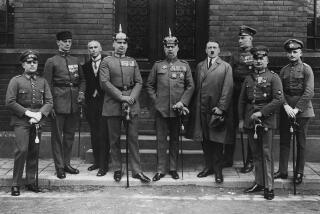Tycoon Vows to Challenge the Kremlin
- Share via
MOSCOW — Russia’s richest tycoon vowed Tuesday to fight prosecutors locked in a showdown with his powerful energy conglomerate, casting it as a battle between a new civil society and a federal security apparatus in its “last grasp of holding on to the power they have held for the last 600 years.”
“Alone, I will not be able to beat anybody. Furthermore, I don’t think that I’m the best choice for a sparring partner. But I am fairly convinced that if we just bow our heads, we’re never going to have a normal society in our country,” Yukos Oil Co. Chief Executive Mikhail Khodorkovsky said in an interview.
The 40-year-old entrepreneur, one of the few businessmen powerful enough to challenge the Kremlin, appeared to signal that the stakes in the most-watched spectacle of the Russian summer are too high for a deal to be struck any time soon.
“I feel that my company and my colleagues are strong enough to be able to withstand this calamity that has befallen us,” Khodorkovsky said. In an interview at Yukos’ modern, high-rise headquarters, Khodorkovsky sought to portray the criminal charges that have put key shareholder Platon Lebedev and security director Alexei Pichugin behind bars as an attempt by Russia’s security apparatus to rein in the forces of the new economy and hold on to political power.
“They’ve never liked” big business, he said, quietly crumpling an aluminum cola can in his fingers until it was nearly flat. “They particularly didn’t like to see the creation of the largest private company in Russia, and an independent one, to boot. But it’s also perfectly obvious that gradually, the political leadership in the country is changing ... and the law enforcement system is losing its power.”
Shady Deals
Khodorkovsky is far from a hero to the Russian public. Polls show that a large majority would look favorably on reexamining the shady privatization deals of the 1990s that catapulted businessmen like him to billion-dollar fortunes gleaned from the purchase of state-held resources that were supposed to be shared with the public at large.
President Vladimir V. Putin has not publicly endorsed the federal investigation of Yukos, but he hasn’t called it off, either. Many Russians think that he is doing the necessary job of reining in powerful oligarchs such as Khodorkovsky, who have increasingly been flexing their muscles in the political arena.
“One thing is clear: It was by definition impossible for a small group of people to knock together multibillion-dollar assets in a country whose economy was lying in ruins.... And since these people are far from being dumb, they must have realized that their wealth was not legitimately earned,” said Oleg Bogomolov, director emeritus of the Institute for International Economic and Political Studies.
“Everyone still understands that these people have made their billions illegally ... and this is a country where one-third of the population lives below the poverty line,” Bogomolov said. “In other words, what these oligarchs have been doing is playing with fire. And sooner or later, this practice will have to be stopped.”
The Yukos case has taken on surreal overtones in the last few weeks, with allegations that Pichugin may have been injected with a “truth serum” by federal security agents who were questioning him last month in connection with the attempted murder of the former chief spokeswoman of the Moscow mayor’s office in 1998 and the disappearance of a pair of associates the same year.
Lawyers’ Allegations
Pichugin’s lawyers said that he lost consciousness half an hour into the interview and that when he awoke, he felt sick and found injection marks on his left arm.
A man, they said, was shaking him on the shoulder and saying: “You put out the contract on the [suspected murder targets], and management assigned you this task.”
Federal authorities have strongly denied using any chemical agents during the questioning, and Pichugin denies having any connection to the crimes.
Khodorkovsky said the entire episode, as he sees it -- the detention of his business partner for months on an unproven embezzlement charge, searches conducted without warrants, no oversight over federal prosecutors -- is evidence of the need for reforms in Russia’s judicial system.
“I too am not surprised that our law enforcement agencies sometimes act in politically motivated ways. This does not surprise me. What does surprise me is they are acting with such blatant contempt for the law, and at such a high level -- that is unusual,” he said. “This means that the approval for all of this to take place had to be given at quite a high political level.”
Khodorkovsky said he is convinced that two key figures are behind the moves against him: Prosecutor General Vladimir Ustinov, a close ally of Putin, and Yuri Zaostrovtsev, deputy head of the Federal Security Service, the domestic successor agency to the KGB.
He said he does not believe Putin is behind it -- “otherwise, the situation would have been a lot tougher,” Khodorkovsky said.
“The law enforcement structures were never the direct holders of power in our country, but they have always been a substantial component of power. And sometimes it is difficult to distinguish where power ends and law enforcement structures begin,” Khodorkovsky said.
But “what we are seeing is a slow -- it is slow, but it does exist -- shift of power toward civil society ... a situation where this last and final obstacle, the non-reform of the law enforcement system, will finally be put behind us,” he said.
“And I do not think that they are so stupid that they don’t understand this.”
*
Alexei V. Kuznetsov of The Times’ Moscow Bureau contributed to this report.
More to Read
Sign up for Essential California
The most important California stories and recommendations in your inbox every morning.
You may occasionally receive promotional content from the Los Angeles Times.










